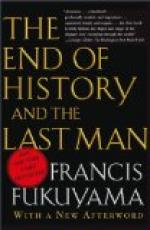|
This section contains 5,370 words (approx. 18 pages at 300 words per page) |

|
SOURCE: “The Scowl of Minerva,” in The New Republic, March 23, 1992, pp. 27-33.
In the following review of The End of History and the Last Man, Holmes provides analysis of Fukuyama's historical perspective and postulations, and cites contradictions in his theoretical assumptions and inattention to historical reality.
I.
The collapse of communism has brought dizziness and disorientation across the political spectrum. For the barbarians, as the poet Cavafy wrote, were a kind of solution. But no longer: the East-West confrontation has lost its power to threaten and to clarify our lives. Even the distinction between left and right, which has underlain all European politics since 1789, has been shaken. Throughout the post-Communist world, from the Baltics to Albania, and now in Russia itself, we are observing waves of radical change that look so far like a liberal revolution. The strangeness of the notion suggests the unprecedentedness of the change. But...
|
This section contains 5,370 words (approx. 18 pages at 300 words per page) |

|


